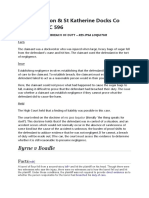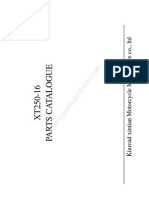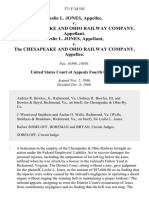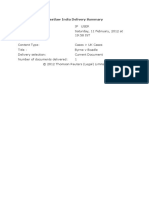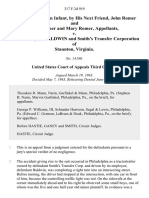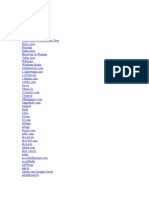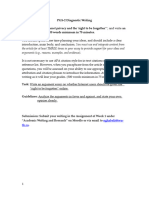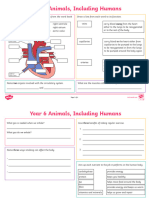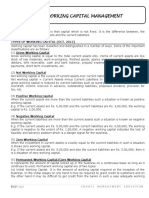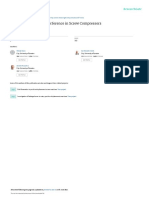Yellow Cab Petn
Yellow Cab Petn
Uploaded by
jdcrutchCopyright:
Available Formats
Yellow Cab Petn
Yellow Cab Petn
Uploaded by
jdcrutchCopyright
Available Formats
Share this document
Did you find this document useful?
Is this content inappropriate?
Copyright:
Available Formats
Yellow Cab Petn
Yellow Cab Petn
Uploaded by
jdcrutchCopyright:
Available Formats
In The Supreme Court of Virginia At Richmond RECORD NO. YELLOW CAB, INC. and WILLIE L. BUTLER Appellants V.
ARISTINE YOUNG Appellee
PETITION FOR APPEAL
TABLE OF CONTENTS Assignments of Error Statement of the Case Question Presented Statement of Facts Argument Plaintiff's evidence establishes that Defendant Butler drove carefully and competently up until he lost consciousness, and offers no explanation, apart from conjecture, for his blacking out. It therefore fails to establish a prima facie case of negligence against Butler. 5 Even if the jury were properly allowed to guess as to the connection between Butler's coughing and his loss of consciousness, Butler cannot be charged with negligence, since the sudden unconsciousness which proximately caused the collision was unforeseable. ... 6 III. A finding that Butler's unconsciousness was foreseeable, and that his coughing created in him a duty to stop his cab, places on carriers an impossible burden of foresight, and reguires of them such timidity as to make taxicab service impractical. 9 Conclusion 13 II. I. Page 2 2 3 3 5
TABLE OF CITATIONS Federal Case Scheffer v. Washington City, Va. Midi., & G. S. R. CO. , 105 U.S. 249 (1881) Virginia Cases Atlantic Greyhound Corp. v. Shelton, 184 Va. 684, 36 S.E.2d. 625 (1946) Brinser v. Young, 208 Va. 525, 158 S.E.2d 759 (1968) Chesapeake & 0. Ry. Co. v. Hibbs, 142 Va. 96, 128 S.E. 538 (1925) Fowlkes v. Southern R. Co. , 96 Va. 742, 32 S.E. 464 (1899) Hogan v. Miller, 156 Va. 166, 157 S.E. 540 (1931) Massie v. Firmstone, 134 Va. 450, 114 S.E.2d 652 (1922) Norfolk-Southern Ry. Co. v. Tomlinson, 116 Va. 153, 81 S.E. 89 (1914) Shamblee v. Va. Transit Co.. 204 Va. 591, 132 S.E.2d 712 (1963) Sykes v. Langley Cabs, Inc, 211 Va. 202, 176 S.E.2d 417 (1970) Travis & Ludwig v. Bullifantr 226 Va. 1, 306 S.E.2d 865 (1983) Wallace v. Jones, 168 Va. 38, 190 S.E.2d 82 (1937) Yellow Cab Co. v. Eden, 178 Va. 325, 16 S.E.2d 625 (1941) Other Virginia authority Va. Model Jury Instruction (Civil) No. 22.000 Foreign authority Norvell's License, 85 Pa. D. & C. 385, 93 ALR3d 326, 355 (1952) 8 9,12 10 7 11 11 11,12 5,7 9 9,10 9 5 7,8 10,13 10 Page
11
In The Supreme Court of Virginia At Richmond RECORD NO. YELLOW CAB, INC. and WILLIE L. BUTLER Appellants V. ARISTINE YOUNG Appellee
PETITION FOR APPEAL TO THE HONORABLE CHIEF JUSTICE AND ASSOCIATES JUSTICES OF THE SUPREME COURT OF VIRGINIA: Your appellants. Yellow Cab, Inc. and Willie L. Butler, are aggrieved by a final order entered on May 11, 1987 in the Circuit Court for the City of Norfolk, Docket no. L86-967/L966-87.
ASSIGNMENTS OF ERROR 1. The trial court erred in overruling Defendants' motion to
strike Plaintiff's evidence. 2. The trial court erred in granting instructions numbers 2, 3,
4, 5, 6, 7, 8, and 9. 3. The trial court erred in overruling Defendants' motion to set
aside the jury's verdict.
STATEMENT OF THE CASE
Appellee, plaintiff below, instituted this personal injury action in the Circuit Court of the City of Norfolk. The issue
came to trial, and at the end of Plaintiff's case-in-chief, Defendants moved the court to strike Plaintiff's evidence on the grounds that she had failed to establish a prima facie case of negligence. The court overruled the motion.
Defendants, noting their exception to the court's ruling, thereupon presented their evidence. At the end of all the
evidence, Defendants renewed their motion to strike, which the court again overruled. The jury returned a verdict for Plaintiff, which Defendants moved the court to set aside. motion and entered therefore now appeal. The court overruled Defendants' Defendants
final judgment for Plaintiff.
QUESTION PRESENTED Where, according to Plaintiff's own testimony, Defendant driver's coughing did not in any way impair driver's ability to drive his cab, to maintain a clear look-out, to obey traffic signs, and otherwise to conform to the rules of safe driving; where driver had never lost consciousness in a car before; and where neither driver nor Plaintiff passenger expected driver to lose consciousness; was driver's coughing sufficient warning of an impending loss of consciousness, or other incapacitation, so as to create in driver, a common carrier, a duty to stop his cab until his coughing ceased?
STATEMENT OF FACTS On June 5, 1985, shortly after 10:00 a.m.. Defendant driver, Willie L. Butler (hereinafter, "Butler"), took on the Plaintiff as passenger in his taxicab, at a filling station at 48th Street and Hampton Boulevard in the City of Norfolk. Plaintiff instruc-
ted him to carry her to her home on New York Avenue in the same city. Butler drove up Hampton Boulevard one block and turned right onto 49th Street. He drove for some distance on 49th Street, There he He
crossing Killam Avenue, until he reached Colley Avenue.
stopped at the stop sign, them turned right onto Colley.
proceeded for two blocks and at the intersection of 47th Street and Colley, suddenly and without warning lost consciousness. He
thus lost control of his cab, which veered to the right, over the
curb, and into the side of a building. were injured in the collision.
Both Butler and Plaintiff
Plaintiff offered no medical evidence as to the cause of Butler's unconsciousness. She testified that he had been eating
an apple as he drove, since leaving the filling station, and that he had begun to cough as they proceeded down 49th Street, from the intersection of Killam Avenue onwards. According to plain-
tiff, Butler's coughing did not impair his ability to drive safely. She testified that he drove for several blocks while
coughing (Transcript at 54), that he observed and obeyed a stopsign (Tr. at 55) , that he looked to see that the way was clear before turning onto Colley Avenue (Tr. at 54) , that he kept his hand on the steering wheel (Tr. at 56) , that, although he was coughing, Butler's driving was fine (Tr. at 77), and that he did not speed. Id. Plaintiff presented no evidence to suggest that
Butler's ability to drive safely was in any way impaired or threatened before he lost consciousness. She testified to no
prior expectation that Butler would lose consciousness or lose control of the cab. She said that she was "concerned" for
Butler, and asked if he was all right, but she made no attempt to leave the cab or to persuade Butler to stop. tiff's evidence Nothing in Plain-
suggests that either she or Butler had any
forewarning that Butler would lose consciousness. Butler testified that he had been eating an apple as he drove and that he commonly ate while driving. He maintained,
however, that he had not bitten the apple until after turning
onto Colley Avenue.
He said that upon taking the first bite, he
began to Choke, either on the juice or the flesh of the apple, and that choking made him cough. all right. sciousness. Butler testified that he had never fainted in a car before. He said that before the accident he had not expected to black out at all. Plaintiff offered no evidence to the contrary. Plaintiff asked him if he was
He responded by nodding and immediately lost con-
ARGUMENT I. Plaintiff's evidence establishes that Defendant Butler drove carefully and competently up until he lost consciousness, and offers no explanation, apart from conjecture, for his blacking out. It therefore fails to establish a prima facie case of negligence acrainst Butler. Plaintiff's evidence contains no indication whatsoever that Defendant Butler was in any way negligent. Plaintiff herself
testified that, up until the very moment at which Butler slumped over the wheel of his cab, his driving was completely faultless. Transcript at 76-77. She testified that he did not speed (Tr. at
77) ; that he made a complete stop at the stop sign at 49th Street and Colley Avenue (Tr. at 55); and that he looked to see that the street was clear before turning. that testimony. 306 S.E.2d 865, Tr. at 54. She is bound by
Travis & Ludwig v. Bullifant, 226 Va. 1, 4-5, (1983); Massie v. Firmstone, 134 Va. 450, 461(1922).
62, 114 S.E.2d 652, ~
Plaintiff testified that Butler ate an apple as he drove, from Hampton Boulevard, onwards (Tr. at 54) , and that, from the 5
intersection of Killam Avenue and 49th Street to the intersection of Colley Avenue and 47th Street, Butler coughed as he drove (id.). Plaintiff offered no evidence, medical or otherwise, as Although she at one point
to the cause of Butler's coughing.
expressed the opinion that he was choking (id.), she offered no evidence in support of that opinion. Plaintiff did not say that Butler's eating or coughing affected his ability to drive safely and carefully. She did not
say that she expected him to pass out or be otherwise prevented from properly operating his cab. She did not say that she
expected him to stop his cab when he began to cough, or to remain standing at the stop sign at the intersection of 49th Street and Colley Avenue. Unless eating an apple or coughing while driving is negligent per se, a proposition argued by Plaintiff at trial but rejected by the trial court (see Plaintiff's Instruction A
refused), there is no evidence in the record of any negligence on Butler's part. The rule of Massie v. Firmstone binds Plaintiff
to the force of her own testimony, which is entirely void of any imputation of negligence to Butler. The verdict is therefore
unsupported by evidence, and should be overturned.
II. Even if the jury were properly allowed to consider the possibility of a connection between Butler's coughing or eating his apple and his loss of consciousness, Butler cannot be charged with negligence, since the sudden unconsciousness which proximately caused the collision was unforeseable. For a defendant to be charged with negligence, the plaintiff's injury must have been "the natural and probable sequence of the negligent or wrongful act, and...such as ought to have been foreseen in the light of attending circumstances." v. Jones, 168 Va. 38, 42, 190 S.E.2d 82, (1937). Wallace
Negligence
carries with it no liability for consequences which are merely possible. Id.
A driver of a motor vehicle, who is stricken by a sudden, unforeseeable, and incapacitating illness, is not chargeable with negligence or liable for any injury which may result. Young. 208 Va. 525, 527, 158 S.E.2d 759, (1968). Brinser v. The legal
standards for foreseeability of injury ought to apply to the foreseeability of sudden incapacitation as well. That is, a
sudden incapacitation is foreseeable if it could reasonably have been anticipated by a prudent man, but not if, though possible, it was wholly improbable. One is not charged with foreseeing that which could not be expected to happen. Va., at 42-43. Wallace v. Jones, 168
So far as appears in the cases, a common carrier,
though required to exercise the highest level of caution in protecting his passengers, has never been required to possess unusual powers of foresight or clairvoyance. Foreseeability in the question of proximate causeand, by analogy, in the question of sudden incapacitationis usually a 7
question for the jury, but when the facts are not disputed and are susceptible to but one inference, it is a question of law. Id. , at 44. The only evidence off erred by Plaintiff demands the
conclusion that Butler, having coughed for many blocks without losing control of his cab or suffering any impairment of his ability to drive safely and prudently (Tr. at 54-55), and
confident that he was "all right" (Tr. at 108, 131.), could not reasonably have expected that he would suddenly lose consciousness because of his coughing. Plaintiff testified to no appre-
hension that Butler's coughing would cause him any incapacitation, and Butler testified that he did not expect to lose In the absence of any evidence from
consciousness.
Tr. at 109.
Plaintiff, outside a bare assertion, that unconsciousness is the natural and probable result of eating an apple, or of an extended spell of coughing, which nonetheless does not impair the sufferer's ability to drive carefully for many blocks through a busy urban district at mid-morning, to observe traffic signs, to keep a proper lookout, etc., this evidence is susceptible of but one inference, which is that such unconsciousness was, as a matter of law, unforeseeable. (But see Gen. 3:iii)
Research has discovered no Virginia cases in which a spell of coughing resulted in a driver's unconsciousness. This in
itself may be testimony to the rarity and unforeseeability of such an occurrence. Nonetheless, in the case of Norvell's
License. 85 Pa. D. & C. 385, 93 ALR3d 326, 355 (1952), a driver hyperventilated after a coughing spell, and blacked out, causing 8
collision.
The
Pennsylvania
court,
in
re-instating
his
operator's license, stated that a driver suddenly stricken with illness not reasonably to be anticipated is not chargeable with negligence. This holding accords with Virginia law and, though
naturally not controlling, should, in the absence of counter authority, carry weight with this Court. Having brought forth neither evidence nor authority to
support her contention that Butler's loss of consciousness was foreseeable, and having thus failed to show that his failure to stop his cab, or to remain standing at the stop sign, was the proximate cause of her injury. Plaintiff failed to state a prima facie case of negligence against plaintiff, and the trial court should have stricken her evidence. ill. A finding that Butler's unconsciousness was foreseeable, and that his coughing created in him a duty to stop his cab, places on carriers an impossible burden of foresight, and requires of them such timidity as to make taxicab service impractical. Va. Model Jury Instruction (Civil) No. 22.000, given in this case, states that common carriers owe their passengers the Model Jury
highest degree of practical care and foresight.
Instruction No. 22.000 cites as authority for its use of the phrase Shamblee v. Va. Transit Co.. 204 Va. 591, 132 S.E.2d 712 (1963), and Norfolk-Southern Ry. Co. v. Tomlinson, 116 Va. 153, 81 S.E. 89 (1914). Significantly, in neither case does the
Supreme Court employ the phrase "highest degree of care and foresight":
It is well established that a common carrier is not an insurer of the safety of its passengers, but it does owe to them the highest degree of care for their safety. It is liable for the slightest negligence that such care could have foreseen and guarded against. Shamblee, 204 Va., at 593 (emphasis supplied); the court in
Norfolk-Southern approved the trial court's instruction that it was the duty of the defendant company in carrying the plaintiff upon its said train to use the highest degree of care for his safety known to human foresight. .. . Norfolk-Southern, 116 Va., at 156-57 (emphasis supplied). A careful examination of the Virginia cases involving a common carrier's duty to its passenger, in which the carrier's duty of foresight was an issue, reveals that, while carriers are required to act most prudently in guarding against dangers which they do or should foresee, they are never required to possess a greater gift of foresight than the ordinary human being. See,
e.g., Scheffer v. Washington City, Va. Midi.. & G. S. R. Co., 105 U.S. 249, 252 (1881) ("...it must appear that the injury was the natural and probable consequence of the negligence or wrongful act, and that it ought to have been foreseen in the light of the attending circumstances." I.e.. same standard of foresight as
for any other defendant); Svkes v. Langley Cabs, Inc, 211 Va. 202, 208, 176 S.E.2d 417, (1970) (repeats Shamblee rule);
Atlantic Greyhound Corp. v. Shelton, 184 Va. 684, 693, 36 S.E.2d. 625, (1946)("highest degree of practical care and caution
known to human prudence and foresight"; emph. supp.); Yellow Cab Co. v. Eden, 178 Va. 325, 16 S.E.2d 625 (1941)(employs the phrase "utmost care, dilligence, and foresight," 178 Va. at 337-38, but 10
goes on to define carrier's duty as foreseeing what "should have been reasonably foreseen and anticipated by a prudent man." Id.
at 342); Chesapeake & 0. Ry. Co. v. Hibbs, 142 Va. 96, 128 S.E. 538 (1925) ("human care, skill, and foresight", 142 Va. at 101; "human prudence & foresight", id.; "reasonably and naturally to be expected", provide id. at 102; "The company was not required to accidents which it could not foresee might
against
naturally occur." Id.);
See also Fowlkes v. Southern R. Co., 96
Va. 742, 32 S.E. 464 (1899), in which the Supreme Court expressly adopts the Scheffer standard, 96 Va. at 747, and finds that "the weight of authority seems to be decidedly against holding the defendant liable for all the actual consequences of his wrongful acts, when they are such as no human being, even with the fullest knowledge of the circumstances, would have considered likely to occur...." Id. at 746 (emph. supp.). Of particular interest in this connection is Hogan v.
Miller. 156 Va. 166, 157 S.E. 540 (1931).
In that case, foresee-
ability was not an issue, since the defendant driver admitted negligence. Id. at 182. The court, however, stated that
"Defendant owed the Plaintiff the utmost care, dilligence, and foresight in the operation of the vehicle...." Id. at 176.
Justice Epes, dissenting, argued strenuously that the standard was incorrect. The case involved a defendant cab driver who
failed to look to the left in entering an intersection in which he had the right of way. The other driver failed to yield, and
struck defendant's car, injuring plaintiff, defendant's passen11
ger.
Justice Epes held that, since there was no evidence that
the defendant would have seen anything to indicate that the other driver did not intend to yield, he could not be held liable for his failure to look. His failure to look, Justice Epes argued,
"only charges him with knowledge of what he would, or ought to have, seen had he looked." Id. at 183. He continued.
The driver of a taxi-cab owes a high degree of care to his passenger; but to say that he owes the "utmost care, diligence and foresight" is not accurate, and if not modified may lead to absurd conclusions. For instance, the utmost care would require that the driver stop before crossing almost every street intersection and that he proceed at practically all times at so slow a rate of speed as to render taxi-cab service well-nigh useless. Id. at 184. Such criticism has led to the modification of the
standard as given in the Model Jury Instructions, by the addition of the word "practical", as noted above. Model Jury Instruction (Civil) No. 22.000. The cases reveal that, when foreseeability is actually an issue in a case of negligence against a common carrier, the Supreme Court in almost every case has stated the carrier's duty of foresight separately and differently from that of care, or has gone on to define the duty of foresight in terms applicable to any defendant, whether a common carrier or not, or has done both. The standard dictated by the jury's verdict here is inconsistent with the universal standard of foreseeability with regard to proximate causeusually words to the effect of "the natural and probable consequence of the negligence or wrongful act, which ought reasonably to have been foreseen in the light of all the 12 See Commentary, Va.
attending circumstances"which applies to carriers as well as all other defendants. Va., at 342. requiring of See, e.g., Yellow Cab Co. v. Eden. 178
The jury's standard also has the absurd effect of ordinary taxi drivers a greater than ordinary
ability to see into the future. The backward-looking standard established by the verdict
below will henceforth, if upheld, require every carrier to stop his vehicle or any time some indisposition, such as coughing, the remotest possibility of
sneezing,
hiccoughs,
raises
subsequent unconsciousness or other incapacitywhich is never wholly without the realm of possibility. Thus, since it is
conceivable that a driver with a cold might sneeze so violently as to lose control of his vehicle, or might even black out, drivers with colds may not now carry passengers. A finding of
negligence under such an extreme standard is contrary to law and should be set aside.
CONCLUSION For the reasons stated above. Appellants respectfully request that the judgment of the Circuit Court be overturned and that judgment be entered in favor of Appellants. Respectfully submitted, YELLOW CAB, INC. and WILLIE L. BUTLER
BY Of Counsel 13
CERTIFICATE Appellants hereby certify the following: 1. That the Appellants are Yellow Cab, Inc. and Willie L. Butler, and Counsel for Appellents is George J. Dancigers, Attorney Heilig, McKenry, Fraim, & Lollar Stoney Point Center 700 Newtown Road Norfolk, Virginia 23502 Telephone (804) 461-2500 That the Appellee is Aristine Young, and that Counsel for Appellee is Leonard D. Levine, Attorney 192 Ballard Court Virginia Beach, Virginia 23462 Telephone (804) 490-6273. 2. That a copy of this petition for appeal has been mailed this day to opposing counsel. 3. That they desire to state orally and in person to a panel of the Court the reasons why this appeal should be granted. Done by me, this eleventh day of August, 1987.
George J. Dancigers Heilig, McKenry, Fraim, & Lollar Stoney Point Center 700 Newtown Road Norfolk, Virginia 23502
14
You might also like
- Financial Controlling (2023)Document161 pagesFinancial Controlling (2023)Joe Smith100% (2)
- Scott V LondonDocument3 pagesScott V LondonDanson NdundaNo ratings yet
- Catalogo XT250-16 EEC PDFDocument40 pagesCatalogo XT250-16 EEC PDFtgjoiNo ratings yet
- Fsu Soe Lesson Plan Format 2015Document2 pagesFsu Soe Lesson Plan Format 2015api-313179932No ratings yet
- Byrne V BoadleDocument3 pagesByrne V BoadleBernice Purugganan AresNo ratings yet
- Nichols v. Barton, 201 F.2d 110, 10th Cir. (1953)Document4 pagesNichols v. Barton, 201 F.2d 110, 10th Cir. (1953)Scribd Government DocsNo ratings yet
- Michael Kuberski v. New York Central Railroad Company, 359 F.2d 90, 2d Cir. (1966)Document9 pagesMichael Kuberski v. New York Central Railroad Company, 359 F.2d 90, 2d Cir. (1966)Scribd Government DocsNo ratings yet
- Arthur Collins, by and Through J. Benjamin Kay, Iii, As Guardian Ad Litem v. Seaboard Coast Line Railroad Company, 675 F.2d 1185, 11th Cir. (1982)Document19 pagesArthur Collins, by and Through J. Benjamin Kay, Iii, As Guardian Ad Litem v. Seaboard Coast Line Railroad Company, 675 F.2d 1185, 11th Cir. (1982)Scribd Government DocsNo ratings yet
- Ruth Lohr v. Lawrence Tittle, 275 F.2d 662, 10th Cir. (1960)Document7 pagesRuth Lohr v. Lawrence Tittle, 275 F.2d 662, 10th Cir. (1960)Scribd Government DocsNo ratings yet
- Linda Karen Kline v. Jerry Lynn Weller, Green Field Transport Company, Incorporated, 922 F.2d 836, 4th Cir. (1991)Document3 pagesLinda Karen Kline v. Jerry Lynn Weller, Green Field Transport Company, Incorporated, 922 F.2d 836, 4th Cir. (1991)Scribd Government DocsNo ratings yet
- Glenna Frances Tuck, Administratrix of The Estate of George William Tuck, Deceased v. The Chesapeake and Ohio Railway Company, A Corporation, 251 F.2d 180, 4th Cir. (1958)Document4 pagesGlenna Frances Tuck, Administratrix of The Estate of George William Tuck, Deceased v. The Chesapeake and Ohio Railway Company, A Corporation, 251 F.2d 180, 4th Cir. (1958)Scribd Government DocsNo ratings yet
- William Henry Hanson v. Ralph Stanley Waller, LVL Inc., National Car Rental System Travelers Insurance Company, 888 F.2d 806, 11th Cir. (1989)Document13 pagesWilliam Henry Hanson v. Ralph Stanley Waller, LVL Inc., National Car Rental System Travelers Insurance Company, 888 F.2d 806, 11th Cir. (1989)Scribd Government DocsNo ratings yet
- James A. O'neill, Administrator of The Estate of Earl F. Smith, Deceased v. Reading Company, 306 F.2d 204, 3rd Cir. (1962)Document5 pagesJames A. O'neill, Administrator of The Estate of Earl F. Smith, Deceased v. Reading Company, 306 F.2d 204, 3rd Cir. (1962)Scribd Government DocsNo ratings yet
- Morris Mandelbaum v. United States of America, and Frank Savage, 251 F.2d 748, 2d Cir. (1958)Document6 pagesMorris Mandelbaum v. United States of America, and Frank Savage, 251 F.2d 748, 2d Cir. (1958)Scribd Government DocsNo ratings yet
- Charles S. Callander, As Administrator of The Estate of Alexander S. Callander, Deceased v. Hunter Motor Lines, Inc., and Charley Henry Battle, 327 F.2d 754, 4th Cir. (1964)Document4 pagesCharles S. Callander, As Administrator of The Estate of Alexander S. Callander, Deceased v. Hunter Motor Lines, Inc., and Charley Henry Battle, 327 F.2d 754, 4th Cir. (1964)Scribd Government DocsNo ratings yet
- Evelyn Edmondson Bland v. Norfolk and Southern Railroad Company, Incorporated, 406 F.2d 863, 4th Cir. (1969)Document6 pagesEvelyn Edmondson Bland v. Norfolk and Southern Railroad Company, Incorporated, 406 F.2d 863, 4th Cir. (1969)Scribd Government DocsNo ratings yet
- Phyllis W. Willingham and Dave Willingham v. Trailways, Inc., A Corporation, 697 F.2d 994, 11th Cir. (1983)Document7 pagesPhyllis W. Willingham and Dave Willingham v. Trailways, Inc., A Corporation, 697 F.2d 994, 11th Cir. (1983)Scribd Government DocsNo ratings yet
- Atkinson v. Atchison, Topeka & Santa Fe Ry. Co. Lee v. Atchison, Topeka & Santa Fe Ry. Co, 197 F.2d 244, 10th Cir. (1952)Document4 pagesAtkinson v. Atchison, Topeka & Santa Fe Ry. Co. Lee v. Atchison, Topeka & Santa Fe Ry. Co, 197 F.2d 244, 10th Cir. (1952)Scribd Government DocsNo ratings yet
- Evelyn Walker v. The Ohio River Company, 358 F.2d 733, 3rd Cir. (1966)Document2 pagesEvelyn Walker v. The Ohio River Company, 358 F.2d 733, 3rd Cir. (1966)Scribd Government DocsNo ratings yet
- Leslie L. Jones v. The Chesapeake and Ohio Railway Company, Leslie L. Jones v. The Chesapeake and Ohio Railway Company, 371 F.2d 545, 4th Cir. (1966)Document5 pagesLeslie L. Jones v. The Chesapeake and Ohio Railway Company, Leslie L. Jones v. The Chesapeake and Ohio Railway Company, 371 F.2d 545, 4th Cir. (1966)Scribd Government DocsNo ratings yet
- Seaboard Air Line Railroad Company v. Lucille E. Connor, Administrator of The Estate of Peter Woychak, Deceased, 261 F.2d 656, 4th Cir. (1958)Document5 pagesSeaboard Air Line Railroad Company v. Lucille E. Connor, Administrator of The Estate of Peter Woychak, Deceased, 261 F.2d 656, 4th Cir. (1958)Scribd Government DocsNo ratings yet
- Jacobs v. Southern R. Co., 241 U.S. 229 (1916)Document6 pagesJacobs v. Southern R. Co., 241 U.S. 229 (1916)Scribd Government DocsNo ratings yet
- John Holfester v. The Long Island Railroad Company, 360 F.2d 369, 2d Cir. (1966)Document5 pagesJohn Holfester v. The Long Island Railroad Company, 360 F.2d 369, 2d Cir. (1966)Scribd Government DocsNo ratings yet
- (1889) 14 App. Cas. 337Document44 pages(1889) 14 App. Cas. 337Sudhanshu GuptaNo ratings yet
- Raymond G. Cahill v. The New York, New Haven & Hartford Railroad Company, 224 F.2d 637, 2d Cir. (1955)Document6 pagesRaymond G. Cahill v. The New York, New Haven & Hartford Railroad Company, 224 F.2d 637, 2d Cir. (1955)Scribd Government DocsNo ratings yet
- Cheaspeake & Ohio R. Co. v. Cockrell, 232 U.S. 146 (1914)Document5 pagesCheaspeake & Ohio R. Co. v. Cockrell, 232 U.S. 146 (1914)Scribd Government DocsNo ratings yet
- Ridgway National Bank, Guardian of The Estate of Robert Aiello, A Mental Incompetent v. North American Van Lines, Inc., An Indiana Corporation, 326 F.2d 934, 3rd Cir. (1964)Document10 pagesRidgway National Bank, Guardian of The Estate of Robert Aiello, A Mental Incompetent v. North American Van Lines, Inc., An Indiana Corporation, 326 F.2d 934, 3rd Cir. (1964)Scribd Government DocsNo ratings yet
- Paul W. Thorton v. William Aronoff, 279 F.2d 39, 3rd Cir. (1960)Document3 pagesPaul W. Thorton v. William Aronoff, 279 F.2d 39, 3rd Cir. (1960)Scribd Government DocsNo ratings yet
- William H. Von Lackum, Jr. v. George R. Allan, JR., 219 F.2d 937, 10th Cir. (1955)Document13 pagesWilliam H. Von Lackum, Jr. v. George R. Allan, JR., 219 F.2d 937, 10th Cir. (1955)Scribd Government DocsNo ratings yet
- John A. SNEAD, Administrator of The Estate of Kermit Norma Elswick, Appellant, v. The New York Central Railroad Company, A Corporation, AppelleeDocument8 pagesJohn A. SNEAD, Administrator of The Estate of Kermit Norma Elswick, Appellant, v. The New York Central Railroad Company, A Corporation, AppelleeScribd Government DocsNo ratings yet
- Res Ipsa LoquiterDocument5 pagesRes Ipsa LoquiterRathin BanerjeeNo ratings yet
- William R. Rheaume v. Betsey M. Patterson, 289 F.2d 611, 2d Cir. (1961)Document5 pagesWilliam R. Rheaume v. Betsey M. Patterson, 289 F.2d 611, 2d Cir. (1961)Scribd Government DocsNo ratings yet
- William Currie v. Moore-Mccormack Lines, Inc., 273 F.2d 634, 1st Cir. (1960)Document4 pagesWilliam Currie v. Moore-Mccormack Lines, Inc., 273 F.2d 634, 1st Cir. (1960)Scribd Government DocsNo ratings yet
- Barnet Shoifet v. New York Central Railroad Company, 265 F.2d 208, 2d Cir. (1959)Document5 pagesBarnet Shoifet v. New York Central Railroad Company, 265 F.2d 208, 2d Cir. (1959)Scribd Government DocsNo ratings yet
- Reply Brett MSJ03 RedactedDocument13 pagesReply Brett MSJ03 Redactedhimself2462No ratings yet
- Contract p2 Derry V PeekDocument25 pagesContract p2 Derry V PeekPatricia NattabiNo ratings yet
- Louis P. Lanni v. William Wyer, As Trustee of The Long Island Rail Road Company, 219 F.2d 701, 2d Cir. (1955)Document3 pagesLouis P. Lanni v. William Wyer, As Trustee of The Long Island Rail Road Company, 219 F.2d 701, 2d Cir. (1955)Scribd Government DocsNo ratings yet
- Joseph P. Makowsky, Administrator of The Estate of Albert Makowsky, Deceased v. Michael Povlick and Robert F. Stegmeier, 262 F.2d 13, 3rd Cir. (1959)Document6 pagesJoseph P. Makowsky, Administrator of The Estate of Albert Makowsky, Deceased v. Michael Povlick and Robert F. Stegmeier, 262 F.2d 13, 3rd Cir. (1959)Scribd Government DocsNo ratings yet
- Vera G. Johnstone, Administratrix of The Estate of Carroll D. Hague, Deceased v. The Reading Company, 248 F.2d 71, 3rd Cir. (1957)Document5 pagesVera G. Johnstone, Administratrix of The Estate of Carroll D. Hague, Deceased v. The Reading Company, 248 F.2d 71, 3rd Cir. (1957)Scribd Government DocsNo ratings yet
- Leighton N. Gates v. Goldie v. Willford, 406 F.2d 890, 10th Cir. (1969)Document4 pagesLeighton N. Gates v. Goldie v. Willford, 406 F.2d 890, 10th Cir. (1969)Scribd Government DocsNo ratings yet
- Agnes Haldeman v. The Bell Telephone Company of Pennsylvania and W. Herbert Fry v. Mary K. Wilkinson, 387 F.2d 557, 3rd Cir. (1968)Document6 pagesAgnes Haldeman v. The Bell Telephone Company of Pennsylvania and W. Herbert Fry v. Mary K. Wilkinson, 387 F.2d 557, 3rd Cir. (1968)Scribd Government DocsNo ratings yet
- Leonard Allen Gauldin v. Virginia Winn-Dixie, Inc., Etc., 370 F.2d 167, 4th Cir. (1966)Document5 pagesLeonard Allen Gauldin v. Virginia Winn-Dixie, Inc., Etc., 370 F.2d 167, 4th Cir. (1966)Scribd Government DocsNo ratings yet
- Dostal v. Baltimore & O.R. Co, 189 F.2d 352, 3rd Cir. (1951)Document7 pagesDostal v. Baltimore & O.R. Co, 189 F.2d 352, 3rd Cir. (1951)Scribd Government DocsNo ratings yet
- Union Pacific Railroad Company, A Utah Corporation v. Jimmie Rex Lumbert, 401 F.2d 699, 10th Cir. (1968)Document14 pagesUnion Pacific Railroad Company, A Utah Corporation v. Jimmie Rex Lumbert, 401 F.2d 699, 10th Cir. (1968)Scribd Government DocsNo ratings yet
- Betty L. Harrington, Administratrix of The Estate of Charles Socinski v. Benjamin Sharff, 305 F.2d 333, 2d Cir. (1962)Document9 pagesBetty L. Harrington, Administratrix of The Estate of Charles Socinski v. Benjamin Sharff, 305 F.2d 333, 2d Cir. (1962)Scribd Government DocsNo ratings yet
- Josephine Heilig v. Studebaker Corporation, A Corporation, 347 F.2d 686, 10th Cir. (1965)Document6 pagesJosephine Heilig v. Studebaker Corporation, A Corporation, 347 F.2d 686, 10th Cir. (1965)Scribd Government DocsNo ratings yet
- James Romer, An Infant, by His Next Friend, John Romer and John Romer and Mary Romer v. Claude Rodgers Baldwin and Smith's Transfer Corporation of Staunton, Virginia, 317 F.2d 919, 3rd Cir. (1963)Document7 pagesJames Romer, An Infant, by His Next Friend, John Romer and John Romer and Mary Romer v. Claude Rodgers Baldwin and Smith's Transfer Corporation of Staunton, Virginia, 317 F.2d 919, 3rd Cir. (1963)Scribd Government DocsNo ratings yet
- Avo B. Bethel and The Aetna Casualty and Surety Company, A Connecticut Corporation v. Herbert A. Thornbrough, 311 F.2d 201, 10th Cir. (1962)Document4 pagesAvo B. Bethel and The Aetna Casualty and Surety Company, A Connecticut Corporation v. Herbert A. Thornbrough, 311 F.2d 201, 10th Cir. (1962)Scribd Government DocsNo ratings yet
- Richard Kieffer v. Weston Land, Inc., A Wyoming Corporation, Defendant/third Party v. Coca-Cola West, Inc., Third Party, 90 F.3d 1496, 3rd Cir. (1996)Document7 pagesRichard Kieffer v. Weston Land, Inc., A Wyoming Corporation, Defendant/third Party v. Coca-Cola West, Inc., Third Party, 90 F.3d 1496, 3rd Cir. (1996)Scribd Government DocsNo ratings yet
- Raymond J. Pittman v. Harold A. Littlefield, E. Kenneth Littlefield, Edith L. Howard, D/B/A Littlefield Lumber Co., 438 F.2d 659, 1st Cir. (1971)Document4 pagesRaymond J. Pittman v. Harold A. Littlefield, E. Kenneth Littlefield, Edith L. Howard, D/B/A Littlefield Lumber Co., 438 F.2d 659, 1st Cir. (1971)Scribd Government DocsNo ratings yet
- United States Court of Appeals Third CircuitDocument5 pagesUnited States Court of Appeals Third CircuitScribd Government DocsNo ratings yet
- William J. Bell and Margaret Bell v. Alexander Mykytiuk. William J. Bell, 246 F.2d 938, 3rd Cir. (1957)Document6 pagesWilliam J. Bell and Margaret Bell v. Alexander Mykytiuk. William J. Bell, 246 F.2d 938, 3rd Cir. (1957)Scribd Government DocsNo ratings yet
- Taska v. Wolfe, 208 F.2d 705, 4th Cir. (1953)Document4 pagesTaska v. Wolfe, 208 F.2d 705, 4th Cir. (1953)Scribd Government DocsNo ratings yet
- Montgomery Ward & Company, Inc. v. Mary F. Bailey, 271 F.2d 573, 4th Cir. (1959)Document5 pagesMontgomery Ward & Company, Inc. v. Mary F. Bailey, 271 F.2d 573, 4th Cir. (1959)Scribd Government DocsNo ratings yet
- United States v. Juanita Villa, 46 F.3d 1153, 10th Cir. (1995)Document5 pagesUnited States v. Juanita Villa, 46 F.3d 1153, 10th Cir. (1995)Scribd Government DocsNo ratings yet
- The Doctrine of Res Ipsa Loquitur: Charles CarpenterDocument17 pagesThe Doctrine of Res Ipsa Loquitur: Charles CarpenterRahul BarnwalNo ratings yet
- Larry Francis Weir v. H. A. Simmons, First True and Real Name Unknown, 357 F.2d 70, 1st Cir. (1966)Document8 pagesLarry Francis Weir v. H. A. Simmons, First True and Real Name Unknown, 357 F.2d 70, 1st Cir. (1966)Scribd Government DocsNo ratings yet
- National Labor Relations Board v. Pizza Crust Company of Pennsylvania, Inc., 862 F.2d 49, 3rd Cir. (1989)Document11 pagesNational Labor Relations Board v. Pizza Crust Company of Pennsylvania, Inc., 862 F.2d 49, 3rd Cir. (1989)Scribd Government DocsNo ratings yet
- Charlotte Louise Wilson, Individually, as Personal Representative of the Estate of Darold Floyd Wilson, and as Guardian of Jolene Kay Wilson, Craig Allen Wilson and Jerry Todd Wilson, Cross-Appellant, Gail L. Clay, Individually, as Personal Representative of the Estate of Norman Lee Clay, and as Guardian of Karri Lynn Clay and Boyd Lee Clay v. Burlington Northern Railroad Company, a Corporation, Cross-Appellee, 804 F.2d 607, 10th Cir. (1986)Document6 pagesCharlotte Louise Wilson, Individually, as Personal Representative of the Estate of Darold Floyd Wilson, and as Guardian of Jolene Kay Wilson, Craig Allen Wilson and Jerry Todd Wilson, Cross-Appellant, Gail L. Clay, Individually, as Personal Representative of the Estate of Norman Lee Clay, and as Guardian of Karri Lynn Clay and Boyd Lee Clay v. Burlington Northern Railroad Company, a Corporation, Cross-Appellee, 804 F.2d 607, 10th Cir. (1986)Scribd Government DocsNo ratings yet
- Ruffalo's Trucking Service, Incorporated v. National Ben-Franklin Insurance Company of Pittsburgh, Pennsylvania, 243 F.2d 949, 2d Cir. (1957)Document8 pagesRuffalo's Trucking Service, Incorporated v. National Ben-Franklin Insurance Company of Pittsburgh, Pennsylvania, 243 F.2d 949, 2d Cir. (1957)Scribd Government DocsNo ratings yet
- Ellsworth Willie Wyatt v. United States of America, Chester Chandler v. United States, 388 F.2d 395, 10th Cir. (1968)Document7 pagesEllsworth Willie Wyatt v. United States of America, Chester Chandler v. United States, 388 F.2d 395, 10th Cir. (1968)Scribd Government DocsNo ratings yet
- United States Court of Appeals Third CircuitDocument6 pagesUnited States Court of Appeals Third CircuitScribd Government DocsNo ratings yet
- List of Many WebsitesDocument16 pagesList of Many WebsitesVijay Balu100% (1)
- Diagnostic Writing On The Right To Be Forgotten (Instructions and Article)Document4 pagesDiagnostic Writing On The Right To Be Forgotten (Instructions and Article)preetinder kaurNo ratings yet
- Year 6 Animals Including Humans Revision Activity MatDocument8 pagesYear 6 Animals Including Humans Revision Activity MatAvaPlaysYTNo ratings yet
- Music Theory DNA WorksheetDocument1 pageMusic Theory DNA WorksheetAleksandar Sasa NovakovicNo ratings yet
- NAAG Backpage Sign On 08-31-11Document7 pagesNAAG Backpage Sign On 08-31-11Emily BabayNo ratings yet
- RDL1 - Activity 1.2Document1 pageRDL1 - Activity 1.2EL FuentesNo ratings yet
- Automotive Catalogue - 2021Document12 pagesAutomotive Catalogue - 2021Khushi PatelNo ratings yet
- DIAN NOVITA SARI - LESSON PLAN POETRY (Revised)Document5 pagesDIAN NOVITA SARI - LESSON PLAN POETRY (Revised)Dian NovitaNo ratings yet
- Air Handling Units: Technical CatalogDocument72 pagesAir Handling Units: Technical Catalogarindam02041985No ratings yet
- Scouts and Nature: "Nature Study Is The Key Activity in Guiding and Scouting"-Baden PowellDocument5 pagesScouts and Nature: "Nature Study Is The Key Activity in Guiding and Scouting"-Baden PowellDinnar Diandra ATNo ratings yet
- Class - IX Prose 1 The Sound of MusicDocument2 pagesClass - IX Prose 1 The Sound of MusicNeetu JainNo ratings yet
- Control FPWIN Pro V5.2 Reference Manual: Programming SoftwareDocument176 pagesControl FPWIN Pro V5.2 Reference Manual: Programming Softwaresoryn2007No ratings yet
- Kahoot! - WikipediaDocument41 pagesKahoot! - WikipediaWater ShurikenNo ratings yet
- Like Stars On Earth REFLECTION PaperDocument4 pagesLike Stars On Earth REFLECTION PaperJomelle Ann Pasol ValdezNo ratings yet
- Sport Science Presentation1Document75 pagesSport Science Presentation1tkrakowskiNo ratings yet
- Cot TrendsDocument5 pagesCot TrendsCorrea JannelleNo ratings yet
- LogcatDocument210 pagesLogcatPriyatanu Bazinga DeyNo ratings yet
- Year Seven Second Term 2024Document80 pagesYear Seven Second Term 2024leviokoronkwo123No ratings yet
- Working Capital ManagementDocument38 pagesWorking Capital ManagementABHIJEIT BHOSALENo ratings yet
- HDFC Life Sanchay Plus Retail Brochure Final CTCDocument16 pagesHDFC Life Sanchay Plus Retail Brochure Final CTCPM LOgsNo ratings yet
- Calculation of Rotor Interference in Screw CompresDocument9 pagesCalculation of Rotor Interference in Screw CompresAdrian SetyadharmaNo ratings yet
- Floriculture - HorticultureDocument5 pagesFloriculture - HorticultureRodmar EscolanoNo ratings yet
- Chapter 4 PDFDocument14 pagesChapter 4 PDFJay Brock100% (1)
- Perhaps Love (Simile)Document4 pagesPerhaps Love (Simile)Candy LeeNo ratings yet
- Levy Hermanos vs. Pedro Paterno: FactsDocument5 pagesLevy Hermanos vs. Pedro Paterno: FactsFrance SanchezNo ratings yet
- CHAPTER 5 Sales ManagementDocument50 pagesCHAPTER 5 Sales ManagementFelicia TangNo ratings yet
- Bonding in OrthodonticsDocument111 pagesBonding in OrthodonticsDr.Varun Shankar100% (1)

